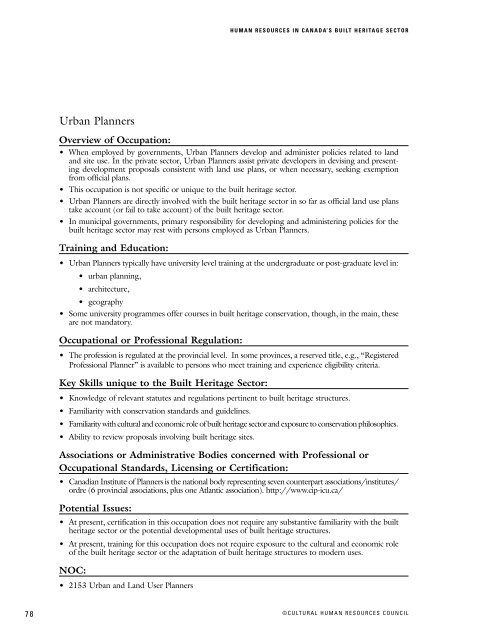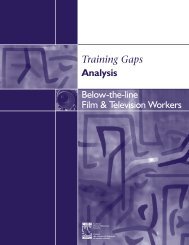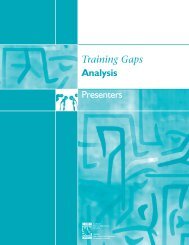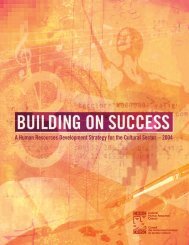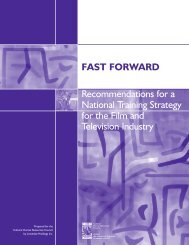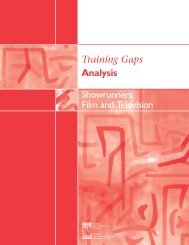Human Resources in Canada's Built Heritage Sector: Mapping the ...
Human Resources in Canada's Built Heritage Sector: Mapping the ...
Human Resources in Canada's Built Heritage Sector: Mapping the ...
- No tags were found...
You also want an ePaper? Increase the reach of your titles
YUMPU automatically turns print PDFs into web optimized ePapers that Google loves.
HUMAN RESOURCES IN CANADA’S BUILT HERITAGE SECTORUrban PlannersOverview of Occupation:• When employed by governments, Urban Planners develop and adm<strong>in</strong>ister policies related to landand site use. In <strong>the</strong> private sector, Urban Planners assist private developers <strong>in</strong> devis<strong>in</strong>g and present<strong>in</strong>gdevelopment proposals consistent with land use plans, or when necessary, seek<strong>in</strong>g exemptionfrom official plans.• This occupation is not specific or unique to <strong>the</strong> built heritage sector.• Urban Planners are directly <strong>in</strong>volved with <strong>the</strong> built heritage sector <strong>in</strong> so far as official land use planstake account (or fail to take account) of <strong>the</strong> built heritage sector.• In municipal governments, primary responsibility for develop<strong>in</strong>g and adm<strong>in</strong>ister<strong>in</strong>g policies for <strong>the</strong>built heritage sector may rest with persons employed as Urban Planners.Tra<strong>in</strong><strong>in</strong>g and Education:• Urban Planners typically have university level tra<strong>in</strong><strong>in</strong>g at <strong>the</strong> undergraduate or post-graduate level <strong>in</strong>:• urban plann<strong>in</strong>g,• architecture,• geography• Some university programmes offer courses <strong>in</strong> built heritage conservation, though, <strong>in</strong> <strong>the</strong> ma<strong>in</strong>, <strong>the</strong>seare not mandatory.Occupational or Professional Regulation:• The profession is regulated at <strong>the</strong> prov<strong>in</strong>cial level. In some prov<strong>in</strong>ces, a reserved title, e.g., “RegisteredProfessional Planner” is available to persons who meet tra<strong>in</strong><strong>in</strong>g and experience eligibility criteria.Key Skills unique to <strong>the</strong> <strong>Built</strong> <strong>Heritage</strong> <strong>Sector</strong>:• Knowledge of relevant statutes and regulations pert<strong>in</strong>ent to built heritage structures.• Familiarity with conservation standards and guidel<strong>in</strong>es.• Familiarity with cultural and economic role of built heritage sector and exposure to conservation philosophies.• Ability to review proposals <strong>in</strong>volv<strong>in</strong>g built heritage sites.Associations or Adm<strong>in</strong>istrative Bodies concerned with Professional orOccupational Standards, Licens<strong>in</strong>g or Certification:• Canadian Institute of Planners is <strong>the</strong> national body represent<strong>in</strong>g seven counterpart associations/<strong>in</strong>stitutes/ordre (6 prov<strong>in</strong>cial associations, plus one Atlantic association). http://www.cip-icu.ca/Potential Issues:• At present, certification <strong>in</strong> this occupation does not require any substantive familiarity with <strong>the</strong> buil<strong>the</strong>ritage sector or <strong>the</strong> potential developmental uses of built heritage structures.• At present, tra<strong>in</strong><strong>in</strong>g for this occupation does not require exposure to <strong>the</strong> cultural and economic roleof <strong>the</strong> built heritage sector or <strong>the</strong> adaptation of built heritage structures to modern uses.NOC:• 2153 Urban and Land User Planners78©CULTURAL HUMAN RESOURCES COUNCIL


